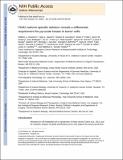PKM2 Isoform-Specific Deletion Reveals a Differential Requirement for Pyruvate Kinase in Tumor Cells
Author(s)
Li, Jie; Sasaki, Mika; Horner, James W.; Burga, Laura N.; Xie, Jianxin; Jurczak, Michael J.; DePinho, Ronald A.; Clish, Clary B.; Kibbey, Richard G.; Wulf, Gerburg M.; Di Vizio, Dolores; Mills, Gordon B.; Cantley, Lewis C.; Israelsen, William James; Dayton, Talya L.; Davidson, Shawn M.; Fiske, Brian Prescott; Hosios, Aaron Marc; Bellinger, Gary; Yu, Yimin; Jacks, Tyler E.; Vander Heiden, Matthew G.; ... Show more Show less
DownloadJacks_PKM2 isoform.pdf (1.288Mb)
PUBLISHER_CC
Publisher with Creative Commons License
Creative Commons Attribution
Terms of use
Metadata
Show full item recordAbstract
The pyruvate kinase M2 isoform (PKM2) is expressed in cancer and plays a role in regulating anabolic metabolism. To determine whether PKM2 is required for tumor formation or growth, we generated mice with a conditional allele that abolishes PKM2 expression without disrupting PKM1 expression. PKM2 deletion accelerated mammary tumor formation in a Brca1-loss-driven model of breast cancer. PKM2 null tumors displayed heterogeneous PKM1 expression, with PKM1 found in nonproliferating tumor cells and no detectable pyruvate kinase expression in proliferating cells. This suggests that PKM2 is not necessary for tumor cell proliferation and implies that the inactive state of PKM2 is associated with the proliferating cell population within tumors, whereas nonproliferating tumor cells require active pyruvate kinase. Consistent with these findings, variable PKM2 expression and heterozygous PKM2 mutations are found in human tumors. These data suggest that regulation of PKM2 activity supports the different metabolic requirements of proliferating and nonproliferating tumor cells.
Date issued
2013-10Department
Massachusetts Institute of Technology. Department of Biology; Koch Institute for Integrative Cancer Research at MITJournal
Cell
Publisher
Elsevier
Citation
Israelsen, William J. et al. “PKM2 Isoform-Specific Deletion Reveals a Differential Requirement for Pyruvate Kinase in Tumor Cells.” Cell 155.2 (2013): 397–409.
Version: Author's final manuscript
ISSN
0092-8674
1097-4172